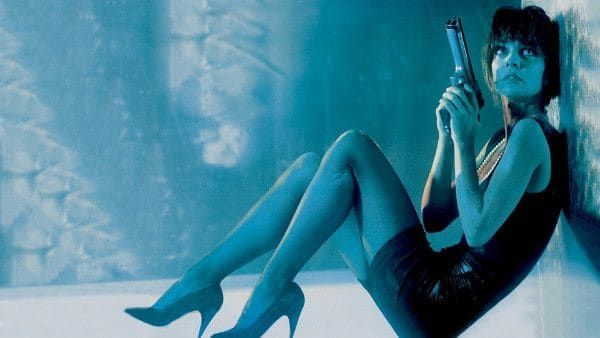Eye For Film >> Movies >> Nikita (1990) Film Review

Take some ingredients and just throw them together. Take a block of butter and stick it in a bowl, pour some wine and vinegar on top, drop in a shallot and microwave. Doesn't sound very appetising? Combined in the right way those ingredients form a deliciously rich sauce. In Nikita (aka La Femme Nikita) Luc Besson takes a quirky romantic comedy and blends in crime, espionage and a touch of Nouvelle Vague. What he serves up is cinema beurre blanc. Contemporate with Nikita, the most memorable action movies also cooked with unconventional ingredients, Die Hard, McTiernan's heartwarming story of family reunion, and Verhoeven's examination of the boundary between real and imagined self, Total Recall. These films all spawned unpalatable remakes and spinoffs trying to recapture the taste of the original (only Die Hard: With A Vengeance had enough vinegar).
It's night time. Four drug addicts walk abreast, dragging behind them a fifth: unconscious, insensate, dead? The colour palette is dark and saturated. The music is pulsative. As an opening, as a statement of intent, this is one of Besson's best. Copied and alluded to but never really surpassed, it says that this film will subvert your expectations. You're in for something different. Upping the tempo, their raid on a chemist descends into an uncontrolled bloodbath. Sole survivor, cop killer, Nikita (Anne Parillaud) is caught, tried, jailed and then murdered in prison. Not a plot twist but a full 180 screeching j-turn, brakes squealing, tyres smoking. It's like the plot pivot Hitchcock put in Psycho. Nikita wakes up in a school for assassins. Time passes. Before she eventually graduates, Nikita has one final task. When she's taken to a fine restaurant, the colours get richer, harking back to the start of the film.

Set loose in the world, Nikita starts to build a new life. She has a new home, a fake job and Marco (Jean-Hugues Anglade) the cashier at the local hypermarché: amour fou. Bob (Tchéky Karyo), Nikita's former trainer and now her handler, is also in love with her. For him it is unrequited. How the love triangle plays out is central to the film. It is heavily dependent on the performances of the actors. Parillaud's passionate, vibrant performance, Anglade's warmth and sensitivity, and Karyo controlling passive aggressiveness mesh into a gentle and wry romantic comedy. If you want to make something look really dark, turn the brightness up first then go down. The screen darkens and the colours become more vivid one last time.
In Nikita, Besson makes a lot of use of repetition, and not just with the colour palette. There is the stylised way that Parillaud crouches at pivotal points in the film. The way that Amande (Jeanne Moreau), one of her tutors, sensually caresses Nikita's face is repeated as she tries to get control over the cleaner Victor (Jean Reno) in the midst of his killing spree.
The techniques Besson uses are are simple and easy to understand. They are blended together with finesse. A little too hot or too cold and the film would be thin and flat or a separated, chunky mess.
The phrase "All you need to make a movie is a girl and a gun" is often attributed to Godard[1]. In Nikita, Luc Besson takes it to its logical extreme without detracting from Anne Parillaud's femininity. It is a classic piece of late Eighties to early Nineties action cinema that outclasses three decades' worth of derivative films and two spin-off TV series.
[1] "C'est Griffith qui a dit ça, ce n'est pas moi" - Jean-Luc Godard - "It was Griffith who said that, it's not me [that said it]."
Reviewed on: 23 Sep 2024














